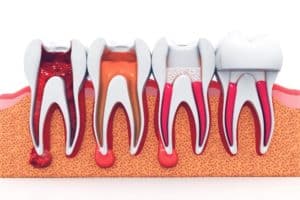Although decaying teeth can be replaced by various means, most dentists will recommend that you maintain your natural teeth whenever possible. For infected teeth at risk of falling out, Dr. Carpenter can perform root canal treatment. This procedure helps to preserve your natural tooth while also eliminating the pain that comes from tooth infection.
What a Root Canal Does

At the center of your tooth is soft tissue known as pulp. This pulp in a broken or decaying tooth is at risk for infection, and over time this inflammation can lead to serious pain and possibly the tooth falling out of your mouth.
Tooth pulp is critical to the development of the tooth. However, if it becomes infected, it is important that it be cleaned out and the newly vacant area filled. The root canal procedure leaves behind a healthier tooth that should be able to survive in your mouth.
Symptoms That May Warrant a Root Canal
Some warning signs that you have infected pulp that could merit a root canal are:
- Significant pain while chewing food
- Ongoing tooth sensitivity after consuming hot or cold foods and beverages
- Jaw pain
- Migraine headaches
- Tender gums
- Swelling of the gums, face or mouth near the infected tooth
If you are experiencing some of these symptoms, you should schedule an appointment with Dr. Carpenter. He will use X-rays to assess the full extent of the problem and determine the proper course of action.
Root Canal Procedure Details

After numbing your mouth, Dr. Carpenter will create a tiny hole at the top of your tooth. Through that hole, he will use special instruments to clean out your tooth canals and remove the infected pulp and nerves. Medication is inserted to further kill the infection. Before you leave, Dr. Carpenter will use a temporary filling to make sure no debris gets into the tooth in the meantime.
At a second appointment a week or two later, Dr. Carpenter will use a more durable filling solution to permanently fill in the tooth space formerly occupied by pulp. Frequently, teeth that remain fragile following root canal will be topped off with a dental crown for additional protection.
Root Canal Aftercare
Although your treated tooth should remain healthy in your mouth for many years to come, do not assume that the tooth will be safe indefinitely. Proper oral care (routine brushing and flossing) is necessary or the tooth could become reinfected. Since you are less likely to notice symptoms of infection on your own once the nerves have been removed from the tooth, that means it is extra crucial that you schedule regular examinations so that your doctor can look for signs.
Choose Dr. Carpenter for a Root Canal
When a root canal is performed by a dentist who has the expertise to completely clear and fill your tooth without leaving any infected pulp behind, it is almost always successful. Dr. Carpenter has a long track record of fixing decaying teeth so that they can remain in your mouth.
To find out whether root canal can resolve your tooth pain, schedule an appointment at Dr. Carpenter’s office by calling (409) 898-4300.

